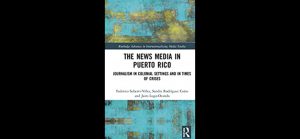
The best way to stop the spread of misinformation in Puerto Rican and all news media is to educate people on what good journalism is from as early as elementary school to college, according to Jairo Lugo-Ocando, PhD. He says that better educated students lead to better consumers of news, which leads to the better spread of news, a “domino effect.”
Last week, Ocando along with Sandra Rodriguez Cotto, an award-winning investigative journalist, and Dr. Federico Subervi-Vélez, from the University of Wisconsin came together on Zoom to discuss their new book “The News Media in Puerto Rico: Journalism in Colonial Settings and in Times of Crises,” and held a Q & A session for viewers during the webinar.
The book offers insight into the lives of 60 journalists from the island regarding the challenges faced by the news media, their profession and journalism education in Puerto Rico.
Cotto also offered some of her personal experiences as a Puerto Rican journalist. “I have been a victim of online harassment,” she said, as she explained that not everyone is happy to hear the stories that she writes. “I write the truth.”
When the public doesn’t agree with stories, they tend to change the narrative and harass journalists, according to Cotto. Fake news is spread, and so are threats. “I’ve even had photoshopped images of me as a pig made,” said Cotto.
Cotto spoke on how so much of the reporting she sees being done in Puerto Rico has been spun into entertainment. “It’s a lot of noise,” she said and continued to explain how trying to make news “popular” makes it lose its value because opinions tend to get thrown in the mix.
The webinar is about the book but the panelists also had advice to offer students, acknowledging that not everyone is educated in news literacy. In order to understand the role of journalists in Puerto Rico it is essential to have a full understanding of what they are reporting and be able to prove its accuracy. Proving accuracy builds a stronger relationship between the media and journalists according to Ocando.
Vélez encouraged students to fact check, and even posted a number of fact checking resources in the chat that were easy for students to navigate. “When in doubt, question, search, do background before you take the alarmist view and pass it forward to others who may not be as informed or smart as you are,” said Vélez.
The three say the book is an essential reading to better understand the colonial situation of Puerto Rico, the present and future of the news media and to guide research on issues in the field of communication sciences within colonial and neo-colonial cultural contexts.
“The public can change,” said Vélez, hopeful that educating people is the answer to ending Puerto Rico’s dependence on the states for their news reporting. “I’m optimistic being a journalist, because of all the technology, people can have access to accurate sources. There is a lot of noise, but once you have been taught, you can filter it out, and be a better consumer of news,” added Cotto.

